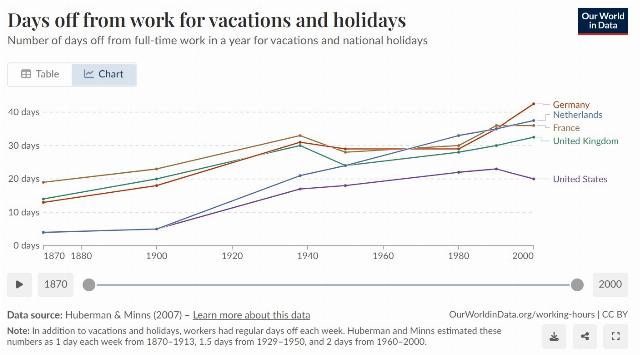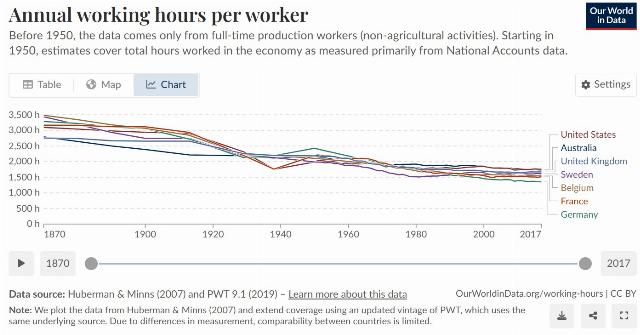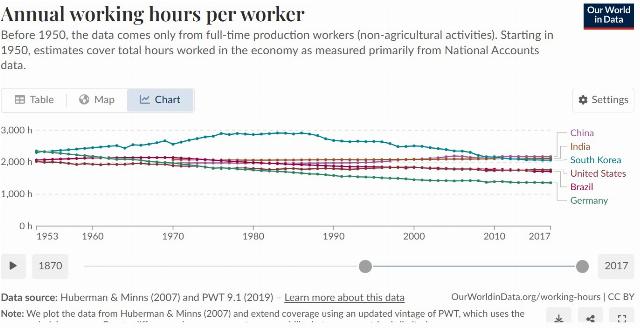Historical accounts show that humans have always sought a utopia, especially in the workplace. We all want the workplace to be a pleasant and harmonious place to grow and establish a career. Today, I hear increasingly more about the changing nature of the workplace and the general attitude toward work, particularly by the less seasoned. Newer folks on the work scene are demanding work-life balances and more extensive time off to reset themselves from the workplace demands, and some are requesting to work fewer hours. Okay, I get it, you get it, but at what cost? If humans want more time off and career resets, will machines and robots take over their work tasks and hours? More and more people are finding themselves unhappy in their jobs, but at the same time, they do not want to lose their jobs to robots. Is there a utopia? Of course, says Current Affairs, who said that employees should work less! If there is a utopia, and we are pursuing it, employers will march in robots to replace you when you require longer work resets, relieve you during an extended time off, and fill the work gaps to create happier workplaces. Here is the dilemma: people want to work less but consume more than their production. If the vision of today's workers is utopian, then robots and machines are the only remedy.
The data supports an ever-growing population of work-related robots tasked with the work humans once did, not just as jobs but as whole careers. What is coming to a head is a vision for the workplace that started some time ago, and the fact that our memories tend to be short -- we forgot the work arrangements and policies advocated a decade ago that are here now to deal with. Since the days of the early 1900s to date, the workplace has tried everything from new production methods to work from home policies, now to implementation of robotics. Like you, I like to deal with human employees, but lately, humans seem to want to work less and less. Does this sentiment leave employers with few decisions? Or trade-offs?
Just think about this: the most common objection to the workplace is a need for work-life balance, doing less repetitive tasks, getting away from toxic colleagues, working less and playing more, etc. I can go down a long list, and you can too, but what if robotics, enabled with machine learning, can bring about the utopian workplace vision? The utopian vision laments a need for work-life balance, resets, and rids the workplace of toxic people. Is this vision a reality? People seeking a work-life balance say they must work fewer hours and play more. They believe people are more productive when a longer time is spent away from work. I agree with this notion, but not wholesale. The reality is that most employers can fill these gaps using robots, relieving the burden of work and allowing for more personal time. Right?
People need resets, but marketplace demands are continuous. I often hear employees say they need a long break from work. This is an accurate statement for many, but for some, not so much. However, I get it. While some are degrading their work and career, market demands are still being made. In addition to resets and further demands as new generations enter the workplace, there is the term for difficult people: "toxic." Toxic people in the office have become a significant deterrent to returning to face-to-face office work arrangements. Workplace toxicity has often become the catchphrase for bad workplaces and people who are challenging to get along with. A robot can replace the toxic coworker. The workplace comprises all types of personalities, and to get rid of unreasonable people is a utopian vision in and of itself. Moreover, this vision of a utopian workplace goes deeper than that; it comes down to the number of hours folks are willing to work to justify to employers not having robots fill the gap.
The Harvard Business Review recently published an article titled “How to Keep Working when You're Just Not Feeling It." This article indicates that something has changed in employees' attitudes regarding how work should look which was not there decades ago. Employers will face the decision that if a human cannot do it, a robot will. There was a recent trend of working less during the holidays. Again, the question is, how will work get done? As Figure 1 shows below, people have been working fewer holidays and taking more vacation days off, from the late 1800s to the 2000s.
Let us bring a critical point into focus: By the 1950s to the early 1990s, there was labor productivity growth and a slowdown, with peaks between 2021 and today. Since the mid-2000s, forward labor productivity has increased by 1.5%. On the grand scheme of things, the current workplace has been working fewer hours since the advent of the Industrial Revolution, basically because of machinery. Charlie Giattino and Esteban Ortiz-Ospina put it this way in their article, “Are We Working More Than Ever?”: "Working hours for the average worker have decreased dramatically over the last 150 years. This has come from working fewer hours daily, fewer days weekly, and fewer hours yearly.”

Decades ago, work was centralized, and people stayed with a company until retirement; things certainly changed. Now, people prefer working from home and, instead of having one job until retirement, are expected to spend most of their lives putting experiences and pleasure before work. Now, a central place to work is not the norm but the exception. Employees decades ago knew something back then that people today do not know: employers have to make choices that require trade-offs. The trade-off requires employers to cover the costs of doing business and the price to market for consumer demand; since consumer demand does not end, the employee has to cover the costs of producing the product or offering the service.


Not everyone is pursuing this workplace utopia, but the wave is here to stay. People have decided that work means something different from what it meant decades ago. What choices will employers make if employees desire to work fewer hours year over year? If people prefer fewer working hours and not working in particular seasons, what is the best trade-off, which employers will increasingly add more robots, creating a workplace utopia? Is the robotic utopian vision the relief you’ve been waiting for?
Images: Our World in Data
Source link

